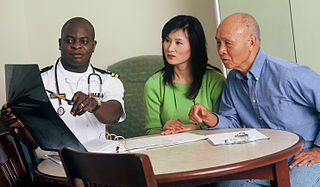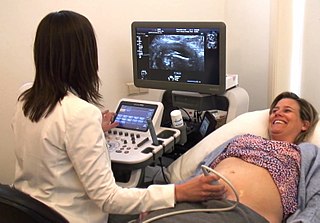
A profession is a field of work that has been successfully professionalized. It can be defined as a disciplined group of individuals, professionals, who adhere to ethical standards and who hold themselves out as, and are accepted by the public as possessing special knowledge and skills in a widely recognised body of learning derived from research, education and training at a high level, and who are prepared to apply this knowledge and exercise these skills in the interest of others.
Bioethics is both a field of study and professional practice, interested in ethical issues related to health, including those emerging from advances in biology, medicine and technologies. It proposes the discussion about moral discernment in society and it is often related to medical policy and practice, but also to broader questions as environment, well-being and public health. Bioethics is concerned with the ethical questions that arise in the relationships among life sciences, biotechnology, medicine, politics, law, theology and philosophy. It includes the study of values relating to primary care, other branches of medicine, ethical education in science, animal, and environmental ethics, and public health.

Adult education, distinct from child education, is a practice in which adults engage in systematic and sustained self-educating activities in order to gain new forms of knowledge, skills, attitudes, or values. It can mean any form of learning adults engage in beyond traditional schooling, encompassing basic literacy to personal fulfillment as a lifelong learner. and to ensure the fulfillment of an individual.

Mentorship is the influence, guidance, or direction given by a mentor. A mentor is someone who teaches or gives help and advice to a less experienced and often younger person. In an organizational setting, a mentor influences the personal and professional growth of a mentee. Most traditional mentorships involve having senior employees mentor more junior employees, but mentors do not necessarily have to be more senior than the people they mentor. What matters is that mentors have experience that others can learn from.

A professional is a member of a profession or any person who works in a specified professional activity. The term also describes the standards of education and training that prepare members of the profession with the particular knowledge and skills necessary to perform their specific role within that profession. In addition, most professionals are subject to strict codes of conduct, enshrining rigorous ethical and moral obligations. Professional standards of practice and ethics for a particular field are typically agreed upon and maintained through widely recognized professional associations, such as the IEEE. Some definitions of "professional" limit this term to those professions that serve some important aspect of public interest and the general good of society.

Professional ethics encompass the personal and corporate standards of behavior expected of professionals.

A stereotype is a widely held and fixed notion of a specific type of person and is often oversimplified and can be offensive. Stereotypes of people and groups are harmful, especially when they lack factual information. Nursing as a profession has been stereotyped throughout history. The stereotypes given to nursing as well as women in nursing has been well documented. A common misconception is that all nurses are female; this misconception has led to the emergence of another stereotype that male nurses are effeminate. These generalized perceptions of the nursing profession have aided in the misrepresentation of nurses in the media as well as the mischaracterization of nurses in the eyes of the public. The image of a nurse depicted by the media is typically of a female being over-sexualized as well as diminished intellectually. This notion is then portrayed in get-well cards, television, film and books. The over-sexualized nurse is commonly referred to as a naughty nurse and is often seen as a sex symbol or nymphomaniac. Along with these common stereotypes, studies have identified several other popular images used in media such as handmaiden, angel, torturer, homosexual male, alcoholic, buffoon and woman in white. Common stereotypes of nursing and portrayal of these misrepresentations have fueled a discussion on the effects they have on the profession.
Allied health professions are health care professions distinct from optometry, dentistry, nursing, medicine, clinical psychology, and pharmacy. They provide a range of diagnostic, technical, therapeutic, and support services in connection with health care.
An advanced practice nurse (APN) is a nurse with post-graduate education and training in nursing. Nurses practicing at this level may work in either a specialist or generalist capacity. APNs are prepared with advanced didactic and clinical education, knowledge, skills, and scope of practice in nursing.
Professionalization is a social process by which any trade or occupation transforms itself into a true "profession of the highest integrity and competence." The definition of what constitutes a profession is often contested. Professionalization tends to result in establishing acceptable qualifications, one or more professional associations to recommend best practice and to oversee the conduct of members of the profession, and some degree of demarcation of the qualified from unqualified amateurs. It is also likely to create "occupational closure", closing the profession to entry from outsiders, amateurs and the unqualified.
Evidence-based nursing (EBN) is an approach to making quality decisions and providing nursing care based upon personal clinical expertise in combination with the most current, relevant research available on the topic. This approach is using evidence-based practice (EBP) as a foundation. EBN implements the most up to date methods of providing care, which have been proven through appraisal of high quality studies and statistically significant research findings. The goal of EBN is to improve the health and safety of patients while also providing care in a cost-effective manner to improve the outcomes for both the patient and the healthcare system. EBN is a process founded on the collection, interpretation, appraisal, and integration of valid, clinically significant, and applicable research. The evidence used to change practice or make a clinical decision can be separated into seven levels of evidence that differ in type of study and level of quality. To properly implement EBN, the knowledge of the nurse, the patient's preferences, and multiple studies of evidence must all be collaborated and utilized in order to produce an appropriate solution to the task at hand. These skills are taught in modern nursing education and also as a part of professional training.

Nursing is a profession within the health care sector focused on the care of individuals, families, and communities so they may attain, maintain, or recover optimal health and quality of life. Nurses may be differentiated from other health care providers by their approach to patient care, training, and scope of practice. Nurses practice in many specialties with differing levels of prescription authority. Nurses comprise the largest component of most healthcare environments; but there is evidence of international shortages of qualified nurses. Many nurses provide care within the ordering scope of physicians, and this traditional role has shaped the public image of nurses as care providers. Nurse practitioners are nurses with a graduate degree in advanced practice nursing. They are however permitted by most jurisdictions to practice independently in a variety of settings. Since the postwar period, nurse education has undergone a process of diversification towards advanced and specialized credentials, and many of the traditional regulations and provider roles are changing.

Nurses in Canada practise in a wide variety of settings, with various levels of training and experience. They provide evidence-based care and educate their patients about health and disease.
The history of nursing in the Philippines stems from the caregiving provided by women, priests, and herb doctors during precolonial Philippines. Even though women did not have much opportunity to be formally educated in schools because only a limited number of Filipino women received primary education in charitable institutions established by Spaniards, this trend continued during the Spanish colonial era. During the Philippine revolution, Filipino women also became the providers of care for wounded revolutionaries. During the American period in the Philippines, Filipino women were given the chance to become educated as nurses, guided by their American nurse and missionary mentors, until nursing became a full-pledged profession in the Philippines, a professional career not only for modern-day women in the country but also for men in the Philippines.

The classical education movement designates a traditional and historic liberal arts education that seeks to restore a robust study of the liberal arts and includes study of the natural sciences, Western literature, the "great books", Western history, and the fine arts. While schools in the movement vary in their use of these categories, the general goal of the classical education movement is to bring this group of studies to contemporary private and public schools as well as to thousands of homeschooling communities.

Paraveterinary worker is the professional of veterinary science that performs procedures autonomously or semi autonomously, as part of a veterinary assistance system. The job role varies throughout the world, and common titles include veterinary nurse, veterinary technician and veterinary assistant, and variants with the prefix of 'animal health'.

The history of nursing in the United States focuses on the professionalization of nursing since the Civil War.
Credentialism and educational inflation are any of a number of related processes involving increased demands for formal educational qualifications, and the devaluation of these qualifications. In Western society, China, and India, there has been increasing reliance on formal qualifications or certification for jobs. This process has, in turn, led to credential inflation, the process of inflation of the minimum credentials required for a given job and the simultaneous devaluation of the value of diplomas and degrees. These trends are also associated with grade inflation, a tendency to award progressively higher academic grades for work that would have received lower grades in the past.

A midwife is a health professional who cares for mothers and newborns around childbirth, a specialization known as midwifery.
Midwives in South Africa are nurses who focus on the care of pregnant women and the delivery of babies. Midwives have the ability to work independently in cases of healthy pregnancies and problem-free deliveries; however, they can refer patients to gynaecologists or obstetricians when complications are diagnosed. The majority of pregnant women in South Africa use the public healthcare system, and most of this care is provided by midwives.












